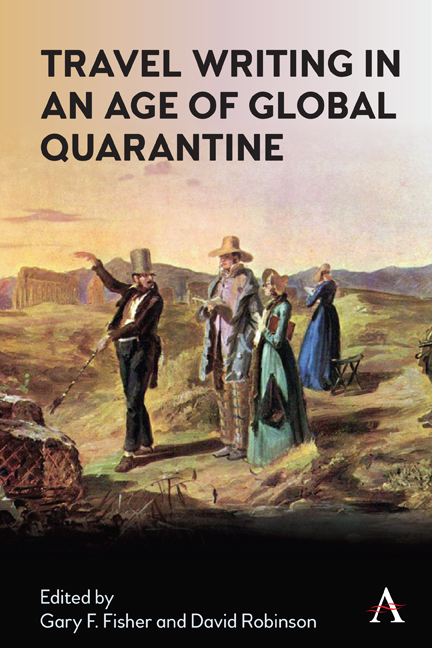Book contents
- Frontmatter
- Contents
- Foreword
- Acknowledgements
- Introduction
- Chapter One ‘Off-Stage, A War’: Wuhan, 1938
- Chapter Two Frederic Lees in Varese Ligure, 1911
- Chapter Three ‘A Rude People Subjected to No Restraint’: In Tanimbar with Anna Keith Forbes, Henry Forbes and So’u Melatunan
- Chapter Four Sent to Coventry: A Journey Home?
- Chapter Five Bedouin Is a Place: Freya Stark’s Travel with Nomads
- Chapter Six With Wilkie in the West: Reading Wilkie Collins’s Rambles beyond Railways from a Cornish Perspective
- Chapter Seven Picturing Rome: Walking the Eternal City with the Last Victorian
- Chapter Eight Su e zo per i ponti; or, How History Does Not Help
- Chapter Nine A Town Called Entropy: Boom and Bust in Arnold Bennett’s Potteries
- Chapter Ten Travelling towards Transculturalism? Statues, Remembrance and Mourning in Bloemfontein, South Africa
- Chapter Eleven Recollections of the King’s House
- Chapter Twelve Occupying Her Time: Ginette Eboué, France, 1940–42
- Epilogue
- List of Contributors
- Works Cited
Chapter Twelve - Occupying Her Time: Ginette Eboué, France, 1940–42
Published online by Cambridge University Press: 18 November 2021
- Frontmatter
- Contents
- Foreword
- Acknowledgements
- Introduction
- Chapter One ‘Off-Stage, A War’: Wuhan, 1938
- Chapter Two Frederic Lees in Varese Ligure, 1911
- Chapter Three ‘A Rude People Subjected to No Restraint’: In Tanimbar with Anna Keith Forbes, Henry Forbes and So’u Melatunan
- Chapter Four Sent to Coventry: A Journey Home?
- Chapter Five Bedouin Is a Place: Freya Stark’s Travel with Nomads
- Chapter Six With Wilkie in the West: Reading Wilkie Collins’s Rambles beyond Railways from a Cornish Perspective
- Chapter Seven Picturing Rome: Walking the Eternal City with the Last Victorian
- Chapter Eight Su e zo per i ponti; or, How History Does Not Help
- Chapter Nine A Town Called Entropy: Boom and Bust in Arnold Bennett’s Potteries
- Chapter Ten Travelling towards Transculturalism? Statues, Remembrance and Mourning in Bloemfontein, South Africa
- Chapter Eleven Recollections of the King’s House
- Chapter Twelve Occupying Her Time: Ginette Eboué, France, 1940–42
- Epilogue
- List of Contributors
- Works Cited
Summary
In June 1940, as the German army advanced through France, Ginette Eboué, a Guyanese philosophy student, found herself in Paris, a city I do not love. Eboué came from an important family. Her brothers Robert and Henry were soldiers at the front, and her parents, Eugénie Eboué-Tell and Felix Eboué, were in the colonies. Unable to flee France in time, Eboué stayed with a distant relation, while she looked for a way to leave and for something to do in the meantime. French historians love Paris. On social media during the Covid lockdown, they regularly lamented about missing their annual research trips and access to patisseries and cheese. My feeling was unending gratitude and relief that I was not stuck in the two-bed flat in a Parisian suburb that had been my home for almost ten years. Instead, I was in a two-bed flat in a village outside of St Andrews, Scotland. Despite having a view of the Eiffel Tower (in winter, when the trees are bare, and only if you lean precariously over the balcony and angle your head to the left), Paris has always left me feeling suffocated. Paris has vast boulevards, world-class architecture and beautiful, curated walks along the Seine, some of which we will visit with Eboué. However, it is in Scotland where one can breathe. Fife has space and colour: fields full of wheat or sheep, dramatic clouds span the horizon and the wind blusters off the North Sea. So, it is from the east coast of Scotland, in the drizzly rain, that we travel from Paris, to the south of France, over the Pyrenees, through Spain and onto Brazzaville with Ginette Eboué. We will experience the German invasion of France, the defeat, the implications of the armistice agreement and the emergence of two different ‘Frances’ – one under Phillippe Pétain in the metropole and one under Charles de Gaulle in the colonies. As we travel with Eboué, we are comforted with how this new reality contrasted with an imagined ideal of Paris and the French Republic while examining how our personal experiences of place and space engage with our historical understandings.
Ginette Eboué's narrative reveals the movement of a wealthy, young, Black woman through the highly regulated space of German-occupied France.
- Type
- Chapter
- Information
- Travel Writing in an Age of Global Quarantine , pp. 161 - 172Publisher: Anthem PressPrint publication year: 2021

